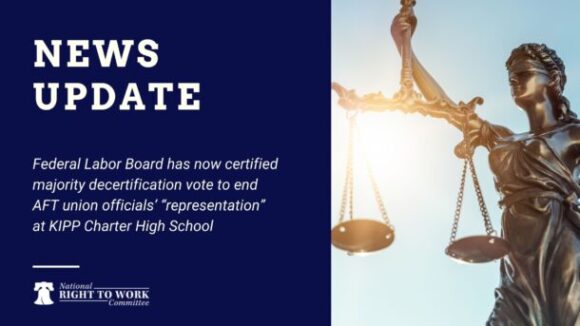Will Team Biden Weaponize Workers’ Pensions?
Big Labor abuse of worker pension and benefit funds as a means of advancing union bosses’ self-aggrandizing policy objectives is a familiar phenomenon.

A year ago this month, the bosses of a Spokane, Wash.-based affiliate of the International Union of Operating Engineers (IUOE), assisted by ace union lawyer and Harvard professor Ben Sachs and a team of lawyers from the San Francisco-based Altshuler-Berzon firm, launched a brazen bid to gut all 26 state Right to Work laws.
The immediate target of the IUOE Local 370 v. Wasden case was Idaho’s three-decade-old state statute. But if the far-fetched legal arguments being brought forth by the union-boss plaintiffs in this case ultimately win acceptance at the U.S. Supreme Court, all 26 state Right to Work laws will be eviscerated.
Determined to ward off the deadly threat to the individual employee’s freedom to join or not join a union posed by union bosses and their lawyers, this spring attorneys for the National Right to Work Legal Defense Foundation teamed up with Idaho attorney David Leroy to file an amicus brief in support of Idaho Attorney General Lawrence Wasden’s defense of his state’s pro-voluntarism labor policy with U.S. District Judge Edward Lodge of the District of Idaho, to whom the IUOE Local 370 case had been assigned.
On Monday, October 24, Lodge rejected the key substantive arguments Sachs and his Altshuler-Berzon team had made against Idaho’s Right to Work law and dismissed their suit, with prejudice.
The union lawyers had contended that, even though federal courts have consistently interpreted the authorization for compulsory union “membership” in Section 8(a)(3) of the National Labor Relations Act to allow the extraction of forced union fees from union nonmembers, the permission explicitly granted to states and territories to prohibit compulsory union “membership” in Section 14(b) of the NLRA should NOT be interpreted to mean that states can make union dues and fees fully voluntary. Sachs and his cohorts offered no remotely plausible explanation as to why the U.S. District Court for the District of Idaho should ignore the legal principle that, with very rare exceptions, if the same word is used more than once in a statute, the judiciary is required to give the word the same meaning wherever it appears in the statute.
In his dismissal, Lodge pointed out that the plaintiffs’ extraordinary reinterpretation of Section 14(b) is, in addition to being illogical, inconsistent with U.S. Supreme Court decisions such as Oil, Chemical & Atomic Workers International Union v. Mobil Oil Corp. (1976). As the court stated in Atomic Workers, “8(a)(3) articulates a national policy that certain union security [i.e., forced-dues and forced-fees] agreements are valid as a matter of federal law,” while “14(b) reflects Congress’ decision that any State or Territory that wishes to may exempt itself from that policy.”
The Local 370 hierarchy alternatively argued that they and other union officials have a constitutional “right” to seize so-called “agency” fees from nonmembers on pain of termination if they refuse. This Big Labor “right” is supposedly protected by the Fifth Amendment’s “Takings” Clause. As Wasden pointed out in a court filing, Right to Work statutes cannot possibly constitute in themselves or facilitate a “Taking” from union officials. Under Idaho’s Right to Work law, IUOE Local 370 and other union bosses are absolutely free, as Wasden put it, to “persuade nonmembers to make voluntary payments” by convincing them that the union furnishes valuable services.
Moreover, as Foundation attorneys and Leroy explained in their brief, “the proper target” for any potential “Takings” challenge to labor laws covering private-sector employees is NLRA Section 9(a), which authorizes union monopoly bargaining in private-sector workplaces located in all 50 states. Concurring with the Foundation/Leroy brief, Lodge concluded:
[E]ven if Local 370 could assert a takings claim, the “property remedy” would be to strike down [Section 9(a)] . . . , rather than striking down Idaho’s right to work law.
Sachs and the Altshuler-Berzon lawyers should surely be discouraged by Lodge’s well-reasoned ruling. Unfortunately, they aren’t. That is apparently because the strategy of the IUOE Local 370 lawyers and their clients is to find a court on which a majority of judges are willing to ignore the facts and the legal precedents and rule in favor of Big Labor, simply because they support compulsory unionism as a matter of policy.
The day after Lodge dismissed the Local 370 bosses’ suit, Altshuler-Berzon lawyer Zoe Palitz told Bloomberg BNA that she “expects the union to appeal Lodge’s decision.”
“We think that the Ninth Circuit [Court of Appeals] and ultimately the Supreme Court will agree with us . . .” and impose forced union fees nationwide, predicted Palitz.
Whether she turns out to be correct about the High Court may well hinge on whether the current vacancy on this nine-seat tribunal is filled by an appointee of rabidly anti-Right to Work outgoing President Barack Obama, equally pro-forced unionism Democratic presidential nominee Hillary Clinton, or avowedly pro-Right to Work GOP presidential nominee Donald Trump.

Big Labor abuse of worker pension and benefit funds as a means of advancing union bosses’ self-aggrandizing policy objectives is a familiar phenomenon.

What impact does handing a union monopoly power to deal with your employer on matters concerning your pay, benefits, and work rules have on your pay?

Federal Labor Board has now certified majority decertification vote to end AFT union officials’ “representation” at KIPP Charter High School